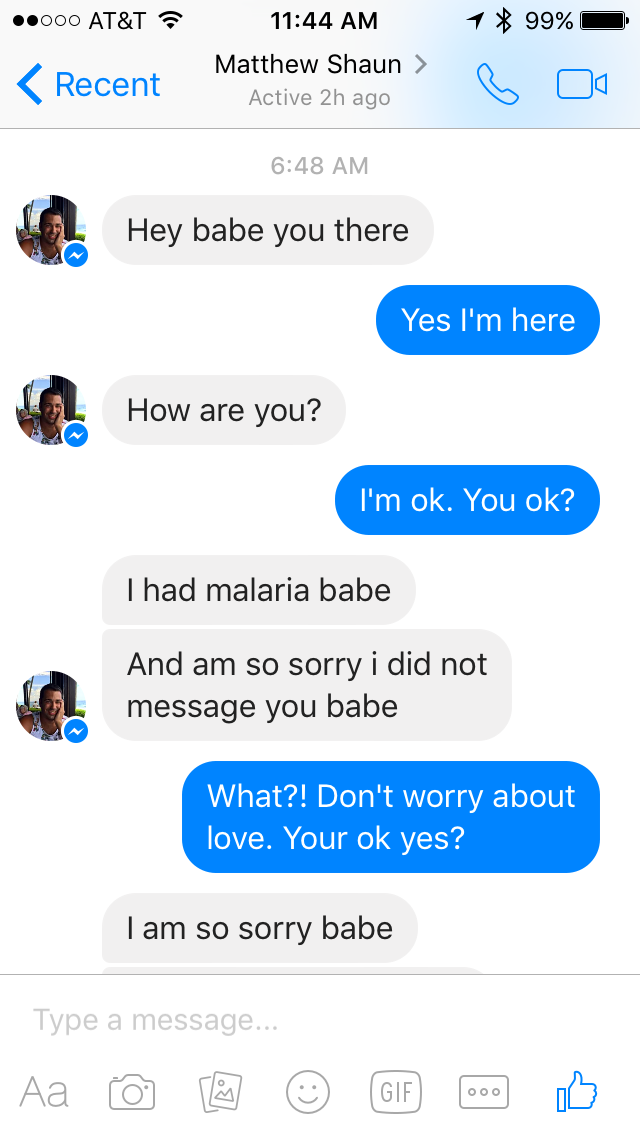Is that cutie on Facebook the one? How to tell a lover from a scammer
Rebecca D'Antonio wasn't lonely when she joined a friend in signing up on a dating app.
"I was riding high on life," she says now. With a supportive circle of friends, an unsuccessful marriage behind her and her long-held goal of owning a home within reach, she wanted only to share the good times she was enjoying. "I wanted to see what was out there."
The connection she made through the dating site in 2016 cost her everything.
D'Antonio became a victim of an online romance scam, a devastating crime that, as Valentine's Day approaches, federal and state fraud watchdogs are warning is only on the rise.

The scams, which begin when a criminal — or group of criminals working together — adopt a fraudulent online identity to form a social connection and gain their victim's affection and trust, were reported by 70,000 people in 2022, according to the Federal Trade Commission. The total cost to those people was $1.3 million. The average loss, according to the FTC was more than $4,000.
Florida, where D'Antonio lives, and where 1,474 people reported losses totaling $53.4 million in 2022, was ranked third in the nation for both the number of victims and the amount of money lost.
Topping Florida were California at No. 1 and Texas with New York and Arizona rounding out the Top 5.
More: West Palm police arrest diners in alleged 'rock in salad' scam: ‘We turned the tables on them’
While many scams begin on dating apps, as D'Antonio's did, no site where a social connection can occur is safe. Most reported scams begin with unsought messages on social media platforms, according to the FTC. Romance scams also have been launched on sites that include Words With Friends, Scrabble, even the Fit Bit app, says Ruth Grover, the founder of ScamHaters United, a romance scam watchdog and support group.
"Anywhere there's a communication link," Grover said.
How scammers learn about your life
After that, the scammers show strikingly similar habits.
They use clues available on the targeted victim's profile, or elicited from the target victim, including hobbies, pets, musical interests, to claim they have much in common, while they seek further information.
They quickly suggest moving to a separate platform, such as WhatsApp, Google Chat or Telegram. This move is a step toward isolating the victim, forming what appears to be the beginning of a relationship and is also efficient, as scammers can work multiple victims at the same time.
They also quickly use affectionate nicknames, with "Honey," "Babe" and "Dear," among the most common, instead of using the victim's first name.
"The victim thinks it's an endearment," Grover said. "It's actually so they don't get the names mixed up."
Where they work is another clue
They tend to have similar jobs, too. Work at faraway military posts, on oil rigs, or as traveling contractors all come with built in excuses to not be able to meet in person. Their foreign posting adds logic to the eventual request for money the scammer will soon make — for emergency funds, for the delivery of a package or present, for airfare home, where the supposed suitor can access a bank account and where the lovers can finally meet.
They usually are strikingly attractive — and often look alike — with 100 fraudulently obtained photos comprising the most common profile pictures used in 2022, according to data collected by Social Catfish, an online dating investigation company. It offers a reverse image search to subscribers that allows victims to look up identities associated with photos posted by would-be suitors.
The criminal who reached out to D'Antonio claimed to be an oil contractor, setting up drilling operations overseas. He also claimed to be a widower with a 5-year-old son. He called himself "Matthew," and sent beguiling photos of a handsome smiling man with a child.
The supposed existence of a young child added to the urgency, D'Antonio said, when her suitor told her his credit card had stopped working, leaving him and his son stranded. "What kind of monster would leave a child endangered?" she asked herself.
And while she did question why she, in a new relationship, should send money, his answers and the illusion of a strengthening bond persuaded her.
"He was in crisis, and I was the only one who could help," she said.
They keep you isolated: Don't tell your friends
A series of crises followed — issues with work permits, traveling papers, an illness, an arrest after he was stopped from boarding a plane home.
At the same time he asked her not to tell anyone about the help she was giving him, saying he didn't want her friends to think badly of him when they finally began their lives together. The secrecy he urged distanced her from friends who had always been supportive.
Overwhelmed by the drama, drained from supporting his family as well as herself, in accumulating debt and facing eviction, D'Antonio began to stockpile sleeping pills.
Her suitor's ardor abruptly cooled when she told him she was out of money and considering taking her own life.
"Cool as a cucumber, he said, 'Do what you have to do,'" D'Antonio recounted.
She hung up and planned to take the pills she had saved that night. First, however, she saved her own life by confiding in a friend at dinner.
"You know this isn't your fault, right?" her friend responded.
Her friend's empathy and insight opened the path to reclaiming her life.
First, she had to declare bankruptcy, a process that taught her that the pain of being a scam victim does not end with the fraud. "Even in recovery, there is trauma," she said.
Other friends researched what had happened to her, showing her she was far from alone. One introduced her to Scamhaters United and Grover.
The world of online romance scammers had come to the attention of Grover more than a decade earlier when after the death of her husband she added the word "widow" to her Facebook profile.
"Within a short time, I became very beautiful to military men," said Grover, who lives in the seaside town of Hartlepool, England, where she and her husband had both worked for the police department.
Suspicious, she began to research the names and faces that suddenly had begun to pop up in her Facebook feed. The same profile photos appeared with other names and other details. The would-be suitors were not soldiers but criminals who were targeting widows, she realized.
"It disgusted me," she said.
Support groups on internet help stave off the shame
She launched Scamhaters United on Facebook. Volunteers search for scammers, post warnings on the pages of confirmed scammers and offer support to victims and people who have targeted.
When D'Antonio contacted her, Grover recalled, she didn't know that she had been the victim of an organized scam. "She thought he was just an awful man."
"It helps us greatly that they use the same script," Grover said.
More: Worried about your kids getting scammed by online crooks? Tech tips to protect kids online
Looked at together, the predictability of that script helps victims realize they were dealing with criminals. Repeated elements of the scams include the supposed jobs that keep them out of the country (almost always work on an oil rig, in the military, or as a contractor), their reasons for being single (If widowed, their wives died in a car crash, of cancer or in childbirth. If divorced, the wife was unfaithful), And their terms of endearment. Reliably, Grover said, they always send a good night text.
The scam targeting D'Antonio ended seven years ago. She has emerged from bankruptcy and finally owns her home. She has learned, she said, to be her own hero. And she offers her support to other victims sent to her through ScamHaters United.
"I live by example," she said. "You can come back from this."
Antigone Barton is a reporter with The Palm Beach Post. You can reach her at avbarton@pbpost.com. Help support our work: Subscribe today.
10 signs your online suitor is a scammer
Serves in the military or travels internationally for work: They have jobs that offer a built-in excuse as to why they cannot meet.
Very good looking: If they look to good to be true, they likely are. Perform a reverse image search to verify their identity.
Let's go somewhere we can be alone: Scammers quickly ask to move communications off the dating service or social media platform where you met. They will want to contact you privately through your personal email or phone.
Love before first sight: Scammers profess love with unusual speed, after messaging for only a short period of time without having met in person.
Facetime, live chat, camera don't work: If the person keeps making excuses as to why they cannot video chat, it is a scam.
Terms of endearment: Scammers call you terms such as "sweetheart" and "honey" instead of using your name. This helps them avoid the risk of using the incorrect name while they juggle many victims.
Grammar really is important: Most romance scammers live in Nigeria, and while they speak English, their written grammar is generally poor.
Only you can help me: They claim to have a family, medical or travel-related emergency and can't access their own funds. They ask for money in the form of crypto or gift cards, which are harder to trace. Anyone insisting that you help them by sending cryptocurrency, giving the numbers on a gift card, or by wiring money is likely a scammer. If someone tells you to send money to receive a package, it’s a scam.
The only luck they have is bad: One emergency follows another when you're dealing with a scammer.
It's just you and me: Scammers will request you tell your friends and family little about your relationship. Confide in people close to you and listen to their concerns.
Sources: Florida Department of Agriculture and Consumer Services, the Federal Trade Commission, ScamHaters United, Social Catfish.
Sound familiar? Scammers' eight favorite lies in 2022

"I or someone close to me is sick, hurt, or in jail"
"I can teach you how to invest"
I'm in the military, far away"
"I need help with an important delivery"
"We've never met, but let's talk about marriage"
"I've come into some money or gold"
"I'm on an oil rig or ship"
"You can trust me with your private pictures"
*FTC, analysis of 8,70 romance scam reports in 2022.
If you suspect a crime, here's where to report it
Report suspicious profiles or messages to the dating app or social media platform and to the FTC at ReportFraud.ftc.gov. If someone is trying to extort you, report it to the FBI. Learn more at ftc.gov/romancescams.
This article originally appeared on Palm Beach Post: Social media online dating scams from Facebook to Instagram

